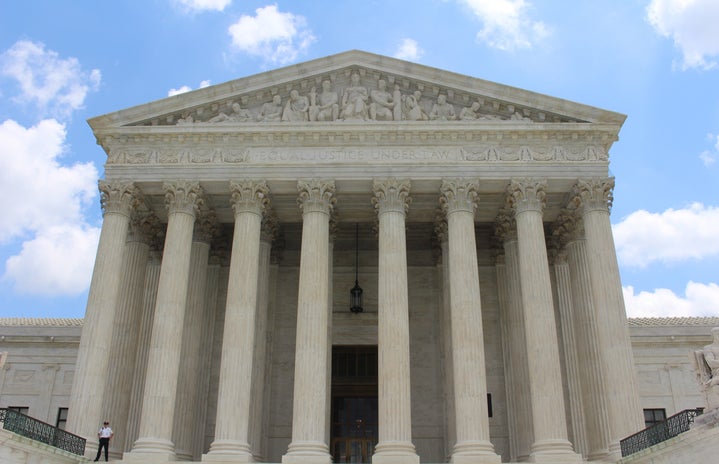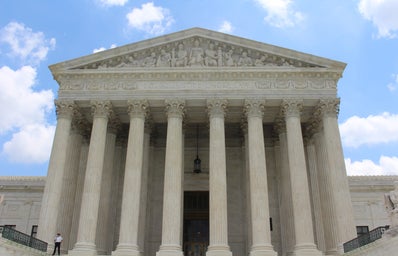Roe v. Wade was a landmark case that was brought to the United States Supreme Court in 1973. Jane Roe — a fictional name used to protect the identity of the plaintiff — filed a lawsuit against Henry Wade who at the time was the district attorney of Dallas County where Roe lived.
Roe was challenging a Texas law that made abortion illegal, unless a doctor ordered it in order to save a woman’s life. She claimed that the law was unconstitutional, vague and that it violated her First, Fourth, Fifth, Ninth and Fourteenth Amendment rights of personal privacy.
In a 7-2 decision, the Supreme Court ruled in favor of Roe stating that the Due Process clause of the Fourteenth Amendment protects a woman’s right to choose whether or not to have an abortion, as it falls under their “right to privacy.”
So what is happening with the case today?
The current Supreme Court is considering overturning the original decision, which would return the decision of whether or not to ban abortion at any stage of pregnancy back to the individual state governments.
A initial draft of a majority opinion was recently leaked that explained that this overturn is likely. Justice Alito wrote:
“The Constitution makes no reference to abortion, and no such right is implicitly protected by any constitutional provision, including the one on which the defenders of Roe and Casey now chiefly rely — the Due Process Clause of the 14th Amendment. That provision has been held to guarantee some rights that are not mentioned in the Constitution, but any such right mist be ‘deeply rooted in this Nation’s history and tradition’ and ‘implicit in the concept of ordered liberty.’ The right to abortion does not fall within this category.”
https://www.politico.com/news/2022/05/02/supreme-court-abortion-draft-opinion-00029473
Many states including Mississippi and Texas have already passed laws that ban abortion after either six or 15 weeks of pregnancy, and include heavy penalties for those who seek, perform, or at all contribute to an abortion. 13 states have already passed what is known as a “trigger law,” that would ban abortion all together if Roe v. Wade is overturned.
So what are the implications of this potential ruling?
Well to start, it is believed that about 26 states will create laws banning abortion in some capacity.
States that continue to allow abortion will likely see an influx of patients, both in-state natives and out-of-state travelers who are seeking care. These laws would disproportionately affect people of color. For example, women of color comprise about 80% of those receiving abortions in the state of Mississippi, despite comprising only 40% of the population. They are likely to have more difficulty traveling in order get an abortion and therefore will be disproportionately affected by these laws.
Additionally, in states like Missouri the proposed anti-abortion legislation would make it illegal to help someone get an abortion, even in a different state, by transporting them, by providing advice/instruction, or by helping them with the procedure financially.
Some states will bring about criminal proceedings against these people, and women who miscarry or who have a stillbirth may also face charges of manslaughter.
It has been said that anti-abortion laws are crafted in a way that harms low-income women. Many will be unable to receive the care they need, and be forced to continue with a pregnancy.
Many of these bans will have no exceptions as well, even in extreme cases.
These cases can include pregnancies resulting from rape or incest, the pregnancy of a minor (even ones who’s bodies are physically unable to carry a pregnancy safely), etc.
This also includes ectopic pregnancies which are embryos that have implanted in a Fallopian tube instead of the uterus that can almost never result in a full-term pregnancy and healthy birth. They are also extremely dangerous to the mother and can cause heavy internal bleeding, shock, and organ damage. They are life threatening and considered a medical emergency, making them extremely dangerous.
Some of these laws would not allow people who are experiencing ectopic pregnancies to receive an abortion.
Women seek abortions for a multitude of other reasons as well. These can include a lack of financial stability that is needed to support a pregnancy and child, age, being stuck in an abusive situation or other partner-related issues, other debilitating medical conditions, genetic predispositions that someone may not want to pass on to a child, the pregnancy is a danger to themselves or the child, they are focusing on other aspects of their lives, they aren’t ready, they do not want children, etc.
Overturning Roe v. Wade will have detrimental effects on the lives of women across the nation, and in my personal opinion — is moving this country backwards.
The Supreme Court expects to arrive at a final decision on the matter by June.


